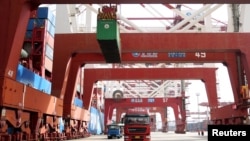A high-level trade delegation from the United States arrived in Beijing Thursday to hold talks with Chinese officials on trade policies.
The U.S. team includes Commerce Secretary Wilbur Ross, U.S. Trade Representative Robert Lighthizer and Treasury Secretary Steve Mnuchin. The Chinese side is led by Vice Premier Liu He, the top economic adviser to President Xi Jinping.
U.S. President Donald Trump has repeatedly said that China has unfair trade policies that hurt the U.S. economy and its workers. Trump also wants to reduce the large U.S. trade deficit with China.
Foreign companies are concerned about policies that, they say, force them to share technology with Chinese partners in order to do business in China.
The negotiations are expected to deal with ways to resolve these trade disputes. In addition, the two sides are expected to discuss newly-announced trade tariffs.
In early April, China announced tariffs on more than 100 U.S. goods, including vehicles, plastic goods and agricultural products. The new tariffs would affect $50 billion worth of U.S. products.
The move followed a Trump administration announcement that it planned to place tariffs on about $50 billion dollars of Chinese exports. Trump has also suggested he is considering putting additional tariffs on up to $100 billion in Chinese goods.
China denies that it carries out unfair trading policies. However, it recently announced moves some observers see as partly answering the U.S. criticism.
Chinese officials have promised to reduce a 25 percent tariff on imported foreign cars by 2022. China also announced it would drop rules requiring foreign automakers to share factory ownership and profits with Chinese companies by the same year.
Trump expressed hope about the new trade talks in a Twitter message late Wednesday. “Our great financial team is in China trying to negotiate a level playing field on trade!” he tweeted. “I look forward to being with President Xi in the not too distant future. We will always have a good (great) relationship!”
U.S. government numbers released Thursday showed the U.S. trade deficit with China fell 11.6 percent in March to $26 billion. That number comes after the deficit in February reached its highest level in nine years.
A Chinese foreign ministry spokeswoman confirmed the talks had begun, but did not provide further information. The spokeswoman said China welcomed the talks. But she said the negotiations should be based on equality and respect, to provide a “win-win” agreement for both sides.
The official China Daily said in an editorial Chinese officials would stand up to any “U.S. bullying as necessary” during the talks.
Christopher Balding is a professor at Peking University’s HSBC Business School. He says getting the two sides to resolve major trade differences during the talks is likely to be very difficult.
“I would be somewhat surprised if there was any real change in the negotiating stance of either party,” he said. He added that the main issue is China’s repeated unwillingness to further open its markets.
Balding said he thinks the best result would be the two sides finding enough room to compromise to avoid getting into a possible trade war.
I’m Bryan Lynn.
Bryan Lynn wrote this story for VOA Learning English, based on reports from VOA News, the Associated Press and Reuters. Mario Ritter was the editor.
We want to hear from you. Write to us in the Comments section, and visit our Facebook page.
_____________________________________________________________
Words in This Story
deficit – n. situation in which a country buys more from other countries than it sells to other countries
tariff – n. tax on goods coming or leaving a country
bullying – n. the mistreatment or abuse of someone by a stronger or more powerful individual
stance – n. opinion or belief about something







